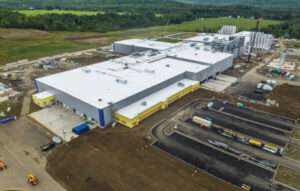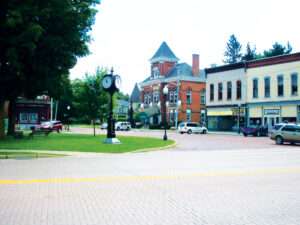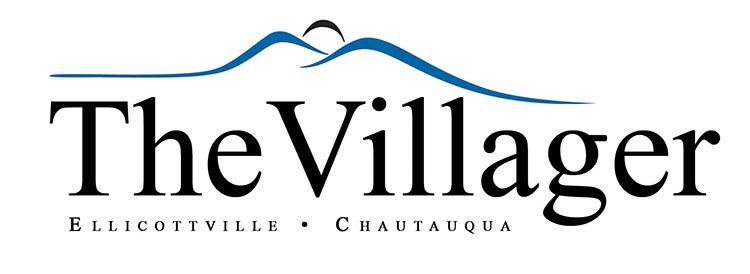By Jeff Martin
Over in Franklinville, the little village that stands to reap big rewards once the sprawling 486,000 square-foot Great Lakes Cheese facility opens in late 2024, Mayor Michael Sikora sees a big future.
Sikora lives near the new plant and, like thousands living here and passing through, he has witnessed the transformation of what was simple flat farmland in April 2022 when workers broke ground. Approaching two years since work began, the site has ballooned into what has become the single largest architectural achievement in Cattaraugus County – perhaps even Western New York.
Once operational, the facility will produce $171 million in goods (American and Italian-style cheeses) and services annually. It will support an estimated 1,186 jobs and generate $459 million in economic activity throughout Western New York. According to the initial application filed by the company with the county, estimated salaries will be significant: $75 – 200,000 for professional/managerial; $75 – 150,000 for skilled and $40 – 75,000 for semi-skilled. Non-skilled salary amounts were not disclosed.
The original price tag for the facility was $500 million, but with inflationary costs, the project has since increased to $621 million.
To produce the 4.5 million pounds of milk (milk output is measured in pounds, not gallons) per day, the facility will require an estimated 632,000 gallons of water per day. To accommodate this, the village had to drill a second well that feeds two holding tanks (north and south).
“We have a good water source to help them,” he said. “We’re taking on some of the plant’s byproduct so we need to be prepared.”
To make all this a reality took Herculean efforts of ingenuity and strength. National Grid has run new electric lines over the surrounding village hills and added and/replaced lines along Route 16. A separate substation will provide power for the plant, affirming what people have suspected: the facility will require a massive number of resources.
“It’s really amazing, what we’re seeing,” Sikora said by phone last week. “It’s ironic because year’s prior, before the plant was announced, the village had been working on a wastewater infrastructure upgrade. After the announcement, it was good timing with what we’d been planning for a long time.”

Built in 1983, the wastewater plant will service both the plant and residents, which to Sikora’s way of thinking, and hope, will increase in number. The village recently completed its new water tower on Mt. Pleasant and testing will begin soon before its operational, Sikora said. In the spring, workers will begin Phase Two of its water line work. Sikora is no stranger to grumblings throughout town about the condition of the roads.
“We’re not doing any work that’s unnecessary,” he said, adding that 100-year-old pipes need addressed more than modern pipes, especially when the infrastructure will have to support what Sikora hopes is a growing population.
“One of the biggest issues we face is housing,” he said. “Right now, with the plant still under construction it’s not a concern, but I do see what real estate is going for and what people are going to need.”
According to Realtor.com, the median listing home price in the village, in October, was $154,000, a figure that reflects a 4 percent average annual increase. In Cattaraugus County, the average home value is $144,000, according to Zillow.com, a 2 percent increase over the past year.
Once the plant is up and running, employing just under 500 on-site workers, many of those workers will need a place to live.
“They’re only going to get so many people willing to travel from all over,” he said.
Sikora said the village board has tossed around some ideas that would help “grow” the village. Some of those discussions center on infrastructure but also housing. Down in the village square, there’s been some business investment: insurance offices and eateries. At 7 Park Square next to Legend’s Bar and Grill, may be the site of future loft-style apartments and downstairs retail, Sikora said. The owner, who bought the building at auction, has nearly gutted the inside and is making great progress.
“He’s got a lot of plans for it,” he said.
Sikora wants to discourage future property owners from purchasing lots and letting them sit empty. It’s happened numerous times over the years, he said.
“I would have to say that all the people who have purchased property in the square have been serious and dedicated to making it the best it can be,” he said.
Sikora said the village plans on applying for state grants that will help finance downtown corridor projects and/or improvements. A recent attempt by the village to collect state grants fell short, he said.
Last Thursday, members of the Cattaraugus County Industrial Development Agency toured the plant’s interior for an update.
“The sheer opportunity to work and warmly welcome a long-standing and industry standard family business such Great Lakes Cheese Co., and their team to Cattaraugus County has truly been a watershed moment for the IDA,” Corey Wiktor, executive director of the IDA, said in a statement. “Over $630 million dollars in investment by such a stature as Great Lakes Cheese Co. and the legacy of the dairy and farming industry in Cattaraugus County. It has been beyond a sincere honor to help and serve the Epprecht’s (founders of Great Lakes Cheese), their leadership and team on the largest economic development project in the history of this great county.”
Interested applicants can apply at www.greatlakescheese.com.
